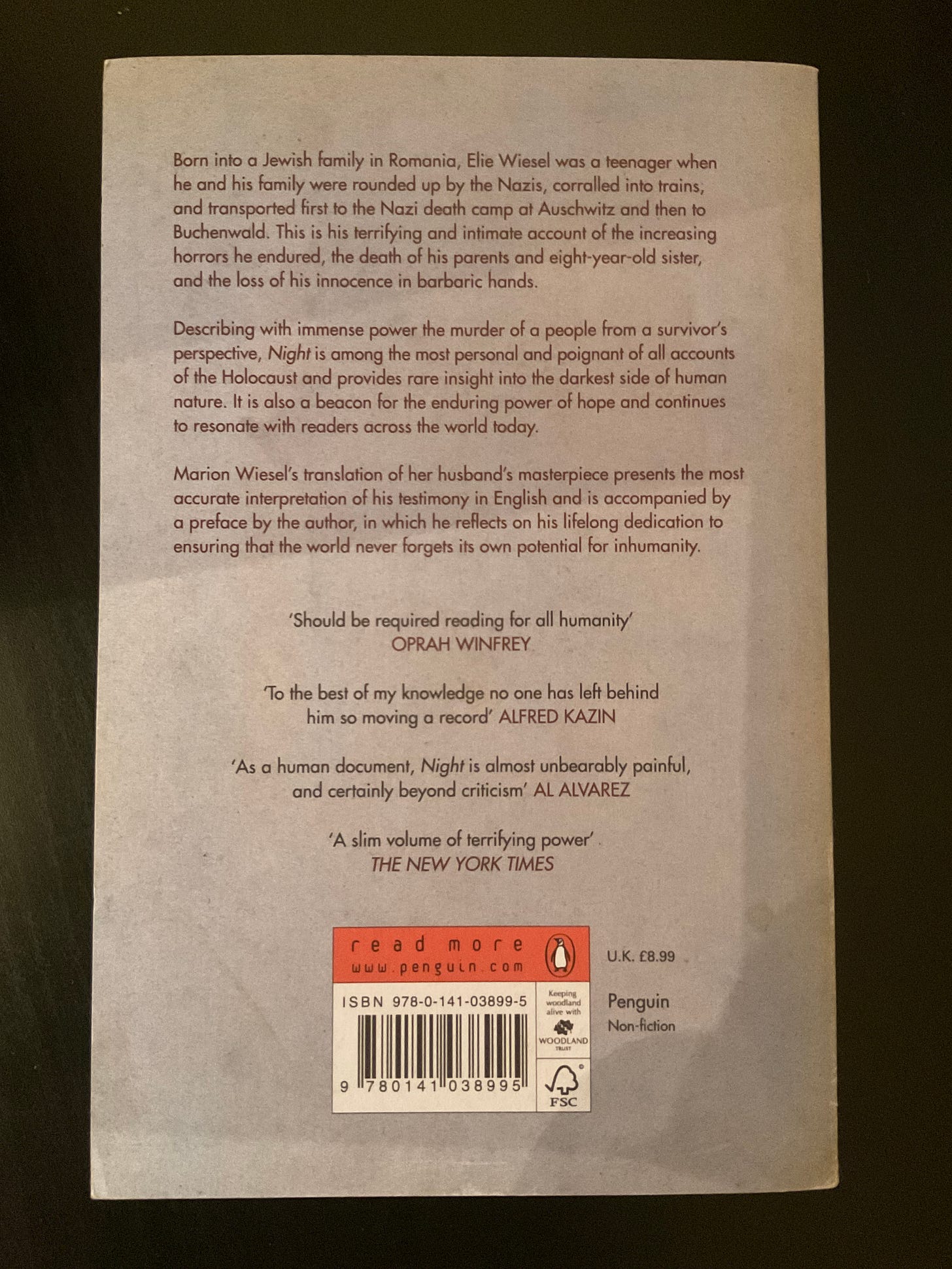If we went for a coffee today, maybe we would talk about “Night” by Elie Wiesel.
How did I get this book?
So, during an open house for parents at Collegiate High School, we were touring the English classroom. The teacher had all the books on display that the students would be reading in the upcoming year. “Night” was one of them.
It caught my eye, because I recognized it as being a famous book, that it won the author a Nobel Peace Prize, and because of the comments that some of the prior students made about it.
It seemed that a major feature of the book was how the author lost his faith.
I was intrigued. I wanted to read it. Especially because my daughter would likely be reading it that year and I wanted to be prepared for the conversation.
I bought it from World of Books, because Amazon has lost my business.
What’s it about?
It’s a memoir of the author’s experience during the Holocaust.
He begins by describing what life was like in his family and community. It’s absorbing to read how the adults in his life were warned of the dangers the Nazi’s posed and how they dismissed it. He carefully records how they were first quarantined, then given the yellow star, then confined in the ghetto, moved to another smaller ghetto, and then finally loaded in cattle cars for Auschwitz.
He details the experience of that first night, witnessing the massacre of women, children and the elderly. It’s when he says that he lost his faith. His mother and sister were killed when they got off the train.
The remainder of the book chronicles the hardships endured in the various concentration camps. His father dies.
Eventually, they were liberated.
The preface is written by his friend, Francois Mauriac and it gives a little more background information on how the book came to be written, published and distributed.
What did I think?
His writing is par excellence. He’s concise, descriptive and wholly engaging. I read this in one sitting. I couldn’t put it down. It was graphic but not crass. It was visceral yet dignified. Incredible.
The book seems to have as its main objective to give an account of a survivor of that awful moment in human history. It’s so horrid that we would want to put it out of our minds and societies. However, if we don’t call to memory these atrocities in each generation, we will undoubtedly let down our guard and suffer profusely again.
Clearly, the repeated question that goes unanswered in the prose is “where was God?” Elie comes from a Kabbalah influenced community. It clearly doesn’t give him enough of a grounding to withstand the circumstances. His age may be the determining factor as he was a young teen. He does relate how the people around him processed their predicament spiritually.
After reading the book, I had a conversation with my good friend, Alan Gilman. He shared how many of the Jews point to the Holocaust as the reason for their atheism.
Elie isn’t alone.
What’s fascinating, is that this story wouldn’t be told without his friend Francois Mauriac who was a committed Christian. Francois gives a rousing gospel presentation in a creative way at the close of the Preface.
According to Wikipedia, Elie did make a return to religion in his later years.
You know what’s interesting? Corrie Ten Boom also survived the concentration camp. She too, lost both of her parents and her sister to the Nazis. Her Christian faith gave her enough grounding to not only endure the atrocities and tragedies, it actually deepened and bloomed into decades of work in reconciliation between former enemies.
Amazing.
If you’re interested. I used “Night” by Elie Wiesel as primary illustration in a recent message at our church.
Conclusion:
There’s a reason this author was given a Nobel Peace Prize. This is an incredible work of art on a necessary topic. It’s good for us to remember and to wrestle with it.
It’s the kind of book that will either deepen your faith, or cause you to lose it.
andy






Good review Andy of an important book.